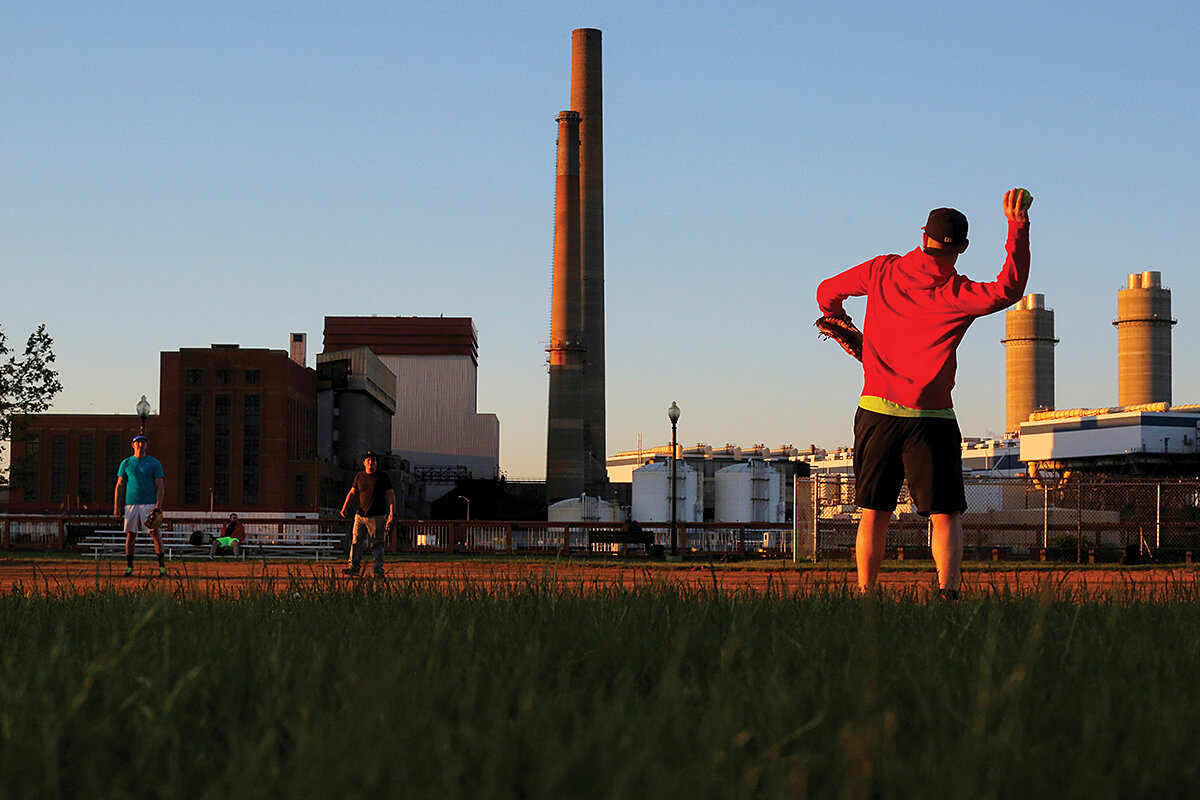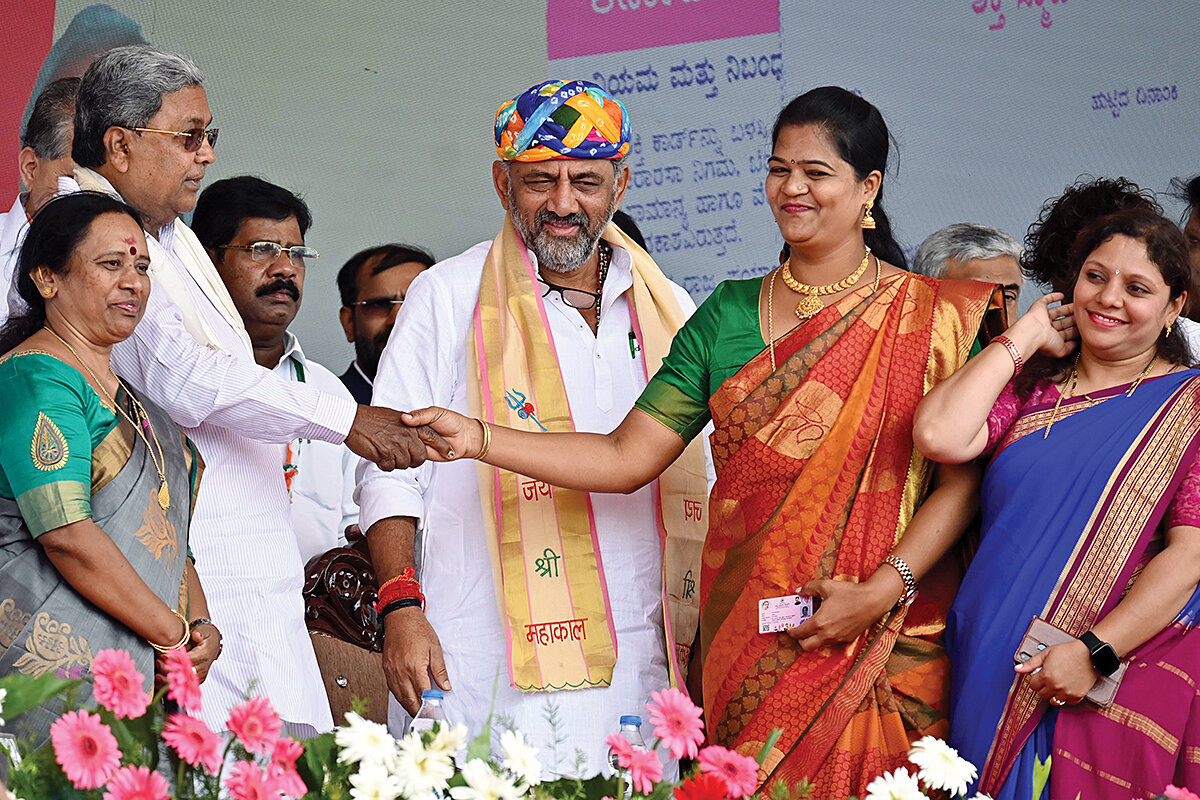Solar panels get a reputation boost, and a green container ship sails
Loading...
1. United States
Rooftop solar panels are helping shore up New England’s power grid even during the winter. Officials say that rooftop solar – long thought to be a small and unreliable source of energy – reduces demand and that one of the region’s largest carbon emitters, Mystic Generating Station, can be retired next May without risking the reliability of the grid.
“Peaker” plants like Mystic are used during high demand to prevent blackouts. In winter, when natural gas demand is high for heating, many peaker plants burn oil instead.
Why We Wrote This
A story focused onIn our progress roundup, solar energy lessens demand on a grid, allowing the third-largest power plant in New England to be safely retired.
The Electric Power Research Institute and ISO New England, the grid operator for six states, found that behind-the-meter photovoltaics contribute significant amounts of energy even when operating at low capacity. The study estimated that every 700 megawatts of solar capacity reduces oil use by 7 million to 10 million gallons, or gas use by 1 billion to 1.5 billion cubic feet. The region currently has 5,400 megawatts of solar capacity, mostly on rooftops.
Researchers stressed that grid reliability is still a concern and that improved weather forecasting is needed. Mystic will be brought offline as the country’s first major offshore wind farm, Vineyard Wind, comes online near Massachusetts.
Source: E&E News
2. Denmark
The first cargo ship powered by green methanol is making its maiden voyage, sailing from Seoul, South Korea, to Copenhagen, Denmark. Danish company Maersk, one of the world’s largest shipping companies, ordered the ship two years ago after committing to only purchasing ships that can run on green fuels.
The ship’s biomethanol is a low-carbon fuel produced from landfill gas that can cut a ship’s carbon emissions by 60% to 75%. (Green methanol is also made from captured carbon dioxide and hydrogen from renewable electricity.) Diesel fuels used in shipping are responsible for particulate pollution and roughly 1 billion metric tons of CO2 every year – about 3% of global emissions and growing.
Investments in port infrastructure and scaled-up production of green methanol are needed for the fuel to be a widely used interim solution toward net-zero goals. Five other major shipping carriers are purchasing green methanol ships, with 120 ships total in the works.
Sources: Fast Company, Canary Media, Safety4Sea
3. Colombia
Colombia slowed deforestation by 29% across the country last year, its best result in a decade. Officials say that what amounts to 50,000 spared hectares (193 square miles) is the result of a historic effort to put the protection of Colombia’s natural resources – especially the Amazon – at the forefront of negotiations with armed groups, which still exert control in some rural areas.
Deforestation by cattle ranching, logging, mining, and farming soared in Colombia after a 2016 treaty disbanded the Revolutionary Armed Forces of Colombia (FARC), which had limited logging, partly to ensure their cover against government air raids. Colombia’s new president, Gustavo Petro, is trying to fulfill a 2022 promise of “total peace,” and one rebel faction, Estado Mayor Central, ordered farmers to stop cutting down trees as a “gesture of peace” toward the government. Some doubt that all armed groups will follow suit, but other observers say the rebels’ move signals growing appreciation for the environment.
President Petro’s administration also attributed the reduction in deforestation to investigating illegal activities and working more closely with local communities to pay them for maintaining forests.
Sources: The Guardian, Reuters
4. Nigeria
An organization of engaged citizens is monitoring Nigeria’s public sector to combat corruption. Since 2014, Tracka has used open data research to encourage citizen participation in government processes.
Experts say that Nigeria’s widespread corruption stems from the lack of accountability and transparency that enable fraud. In 2021, Nigeria’s anti-graft agency recovered 152 billion Nigerian naira ($386 million) in stolen funds earmarked for rural development.
Tracka visits rural communities to document progress on government development projects, training people to participate in budgetary processes and compiling publicly available information that can be used to pressure officials to take action. In 2018, failure to upgrade a health facility in northwest Sokoto state had left patients being cared for outdoors under trees, despite a federal government allocation of 34 million naira ($86,300) for the project. The state renovated the facility after attention was called to the problem by Tracka’s local social media campaign.
Tracka has faced some difficulty gaining community members’ trust, as some view the group as unfairly persecuting elected officials. Safety concerns also prohibit representatives from traveling to some parts of the country. But the organization has successfully reached 967 communities – improving the lives of over 1 million people.
Source: Social Voices
5. India
The Indian state of Karnataka is providing free travel for women and transgender people on state-run buses. The initiative aims to boost women’s mobility and participation in the workforce, which hovers at 23%.
State-run buses saw daily ridership by women increase from 4.18 million to 5.57 million during the program’s first month. Half of the bus seats remain reserved for men.
Many Indian women are dissuaded from traveling because they must ask male family members for money to pay fares. “In India, women’s mobility has always been restricted as a cultural practice,” said Tara Krishnaswamy, whose nonprofit works to elect more women in India. “Even today, in many parts of the country, a woman’s ability to travel alone is in question.”
While skeptics say the initiative will hurt the state’s economy, free buses were a campaign promise made before the May elections by the winning Congress party. The nation’s capital and at least two other states run free bus programs for women, but Karnataka’s is likely the largest.
Sources: The Guardian, India Today, The Quint, Deccan Herald, The Indian Express








